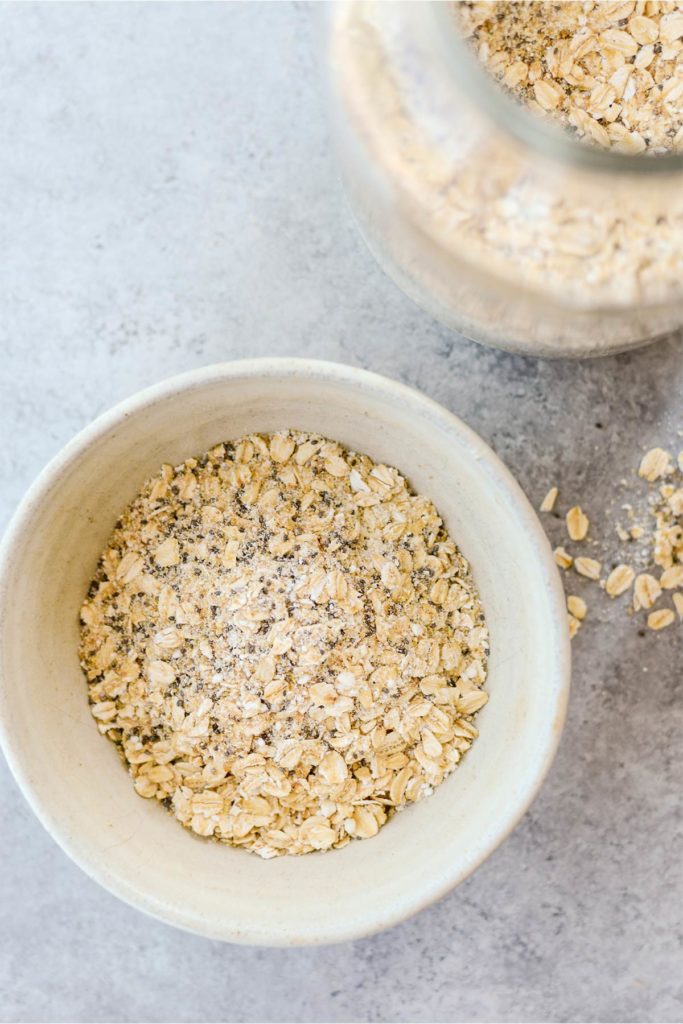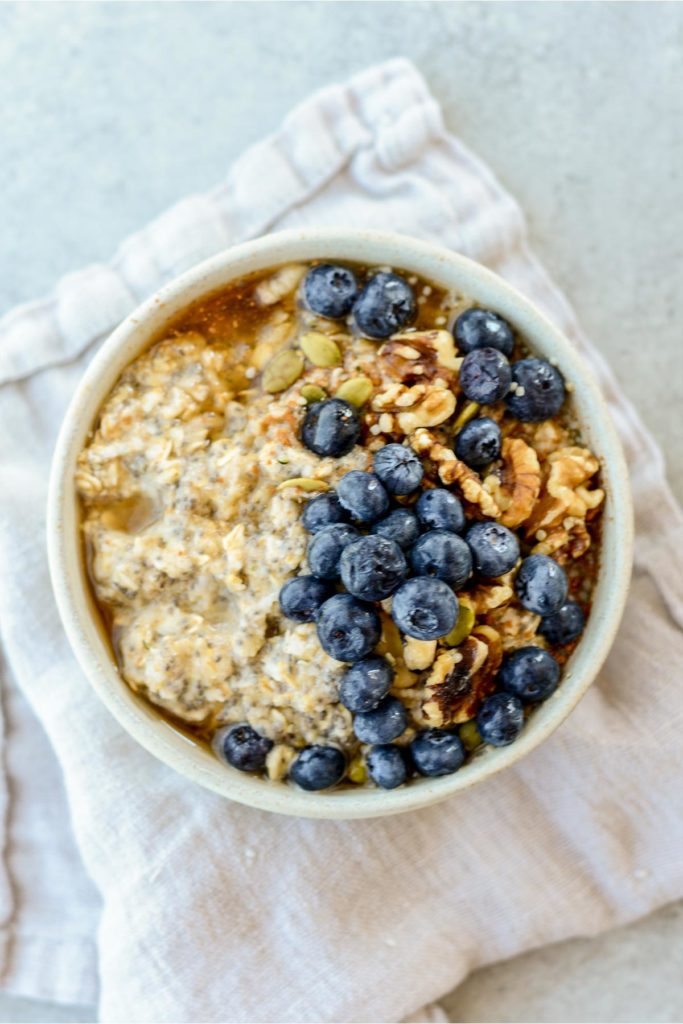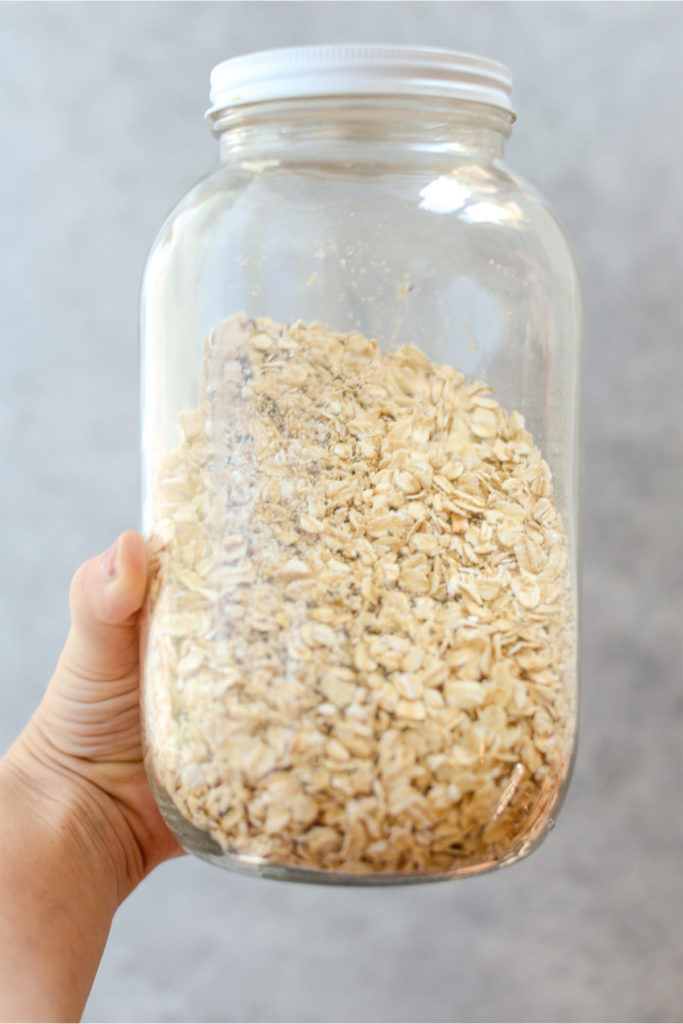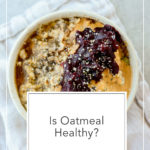Oatmeal is a conflicting topic with some touting its benefits and others leaving it in the dust. So where does it stand and is oatmeal good for you?

Is oatmeal good for you?
That depends on who you ask. And it also depends on each specific body. Even the research is conflicting, whether it’s based on carbohydrates or grains, it makes it confusing to understand where oatmeal falls into the world of health.
Like everything, the health category of oatmeal depends on:
- How your body uses it.
- How you pair it or layer it with other foods.
- The time of day you eat it.
Let’s cut to the chase and break down the truth about whether oatmeal is good for you or not.
What the research says.
The research is split. Food companies would like you to believe that oatmeal has ‘cholesterol-lowering benefits’ while others would tell you it spikes your blood sugar, putting you on the roller coasters of highs and lows.
But if we move beyond the noise and look at oatmeal in itself, here’s what we could find.
Cons to eating oatmeal.
Let’s start with the bad first because it’s always good to end on a high note.
If we pulled all of the negatives out of oatmeal, here would be the list:
- It is a grain, meaning it has all of the anti-nutrient properties that grains do. Includes phytic acid, which has been studied to strip your body from absorbing the vitamins and minerals in the oats.
- It is a high starch or high carbohydrate food. So, in the end, yes, oats can spike your blood sugar, putting you on a “sugar-high” your body doesn’t necessarily agree with. This could potentially cause excess weight gain.
- It is a bland food that leaves many people to spice it up with an extra heaping mound of sugar or two. So problem number two now escalates into a third, fourth, and fifth problem.
Pros to eating oatmeal.
The paleo community and our low-carb fans believe there are no pros. But to create a realistic and simplistic approach to life, I don’t think it’s fair to discount a food without looking at the full story. Not to mention, it is potentially better than the majority of breakfast foods on the market.
Here are the pros:
- It contains a healthy amount of fiber. Given that over 90% of people are no longer getting sufficient amounts of fiber in their diet, oats can help push people past the critical threshold. Oats contain both soluble and insoluble fiber, linking them to potentially reducing cholesterol and diabetes.
- It contains a decent nutritional profile. Considering oats are not a form of produce {fruit or vegetables}, oats have a nutritional profile to look at. Definitely not one to toss out because of the carbohydrate load alone.
- They are versatile. There are countless ways to use oats or oat flour from breakfast to dinner. They make a great base for many healthy recipes that can simplify your diet.
- They are quick and easy. This is quite possibly the biggest reason I keep oats at home {especially true with children}. They are a quick and easy source of nutrition on the fly. From granola bars to granola or even a warm and comforting bowl of oatmeal in the morning, they are a pantry staple in our house.

Should you eat oats?
So, back to the original question… is oatmeal healthy? I think it is fair to say that the pros of oatmeal still outweigh the cons. Although it is important to note the cons given that oats are not an end all be all. The most important factor is listening to your body. How does it respond to a bowl of oats?
If you feel inflamed, become excessively gassy, or feel exhausted after you eat them, it’s probably best to skip them, at least for the time being.
If you’re worried about your weight, I promise you a bowl of oats a few times a week is not the culprit.
But the secret to making oats healthy is not eating them alone or with a heaping mound of sugar.
The addition of too much sugar is where people go wrong.
Maybe we should say oats can become what you make it?
What kind of oats should you eat?
If you dig into the nutrition difference between instant, rolled, old-fashioned or steel-cut, you’ll only find slight variations. In my opinion, it’s not worth worrying about. Eat the type you like. How you pair it is the essential element.
The best way to eat oats.
Like all foods, the best way to prepare a bowl of oats or consume them is in addition to a healthy source of protein and fat—the staples of a well-rounded meal.
Without protein and fat, oats are quickly digested and don’t leave you full for long.
If you’re making oats try adding these ingredients to boost satiety and nourishment:
Healthy fat additions:
- Finely shredded unsweetened coconut
- Hemp hearts
- Chia seeds
- Flax meal
- Pumpkin Seeds
- Buckwheat Groats
- Cocao Nibs
- Coconut Oil
- Nut Butter
- Coconut Milk Yogurt
- Collagen
- Vegan Protein Powder
- A soft-boiled or fried egg
- Cinnamon
- Nutmeg
- Raw Honey

Try this quick hack.
The easiest way to make oatmeal healthy and convenient is to up-level regular oatmeal to store for future use. Here is the recipe I use:
- 6 cups old-fashioned gluten-free oats
- 1/2 cup flax meal
- 1/2 cup Collagen Powder
- 2 teaspoons ground cinnamon
- 1 teaspoon salt
Mix it up and store it in an airtight container.
When you’re ready to make a warm bowl of oatmeal, add your preferred liquid, whether water or milk, in a 1:2 ratio. Once it’s warmed, add in fruit, healthy fats, and a sweetener, or keep it savory with some wilted spinach, salsa, and a soft-boiled egg.
The question is, do you prefer sweet or savory oatmeal?

Thanks very much. This will help to cut down the time to put all the ingredients together each time you need to prepare the dish.
YES! I hope you love it! Keep me posted on anything else I can help with.
I’m looking for your original muesli recipe. Where can I find it?
Ok so I am a Stage 4 Colon Cancer Patient, post surgeries: coloectomy (no colostomy thank you Dr. COSMAN)and left Lung resection of of a Quarter size tumor right above my heart, followed by a course of FOLFOX chemotherapy during which I gained 50 pounds dag Nabit! Upon diagnosing me doc asked me my diet, I was at the time a vegetarian, he said not any more you’re not. You won’t be able to metabolize that type of food without a colon. They gave me my new diet a “Low Residue Diet” basically Carb rich no raw vegis no nuts, seeds, grapes, cantaloupe, no honeydew melon, watermelon, oranges only without seeds, but discouraged. White rice no brown chicken, beef but not processed, no processed meat at all. For that matter no proceesed food at all and for the most part all that still holds true. I went from a very fit 185 riding bicycle 150miles a week to 280 lbs no bike, with sever balance issues, 1 heart attack 2018, 2 pulmonary embolis 2019, screaming at the VA for help. Finally got the MOVE clinic to put me on Qysmia in March and I’m down to 235 Tha n k god
Wow! You’ve been through so much! It sounds like they want to restrict your fiber without a colon, making oatmeal not a great option for you. Of course, it’s hard to get into the specifics here, but it sounds like the use of extra protein in animal products is also essential in healing. You’ve been through so much, and I believe in time, you can get your body back to how it was, back to the activities you love!
Thank you for a brilliant explanation, really helpful.
I am now aware of the right way and mix of eating oats. I love adding pistachios and almonds which I suppose is a good source of proteins and fats, surprisingly you haven’t mentioned nuts albeit some people might have allergies to it. Am I doing something wrong??
No disrespect, ” milk in a 1:2 radio” made my day
I am now 82.. used to be Welter weight.. now I’m at bantam weight.. don’t think it is just age..
Have frequent constipation .. have to make sure fiber large part of my diet while trying to gain back weight..
Think I still get plenty of exercise.. have home gym and a cattle operation which gives plenty of running, lifting , and stretching, etc.. I prefer oats for breakfast, but need to eat high fiber cold cereal..
Any advice??????
Thanks
I p
You could always add a high-fiber addition like flax meal, chia seeds, or psyllium husks to your oats. All of those would add a significant amount of natural fiber. We hope this helps!
You said you need to eat oats cold? There are over night oats. Get a tupper ware container add oats and milk or water chia seeds flax seeds and maybe some peanut butter and let it soak over night it will be nice cold and soft by the time you wake up the next morning.
Hello!! I love this article… I use oats like a carb load before working out. It cuts down on overall fatigue during working out and keeps me from compensation eating. I make up the standard refrigerator oat meal with 1 cup of plain unsweetened yogurt, 1 cup of 2 percent milk and 2 cups of whole rolled oats. 3 heaping tablespoons per container and when I eat it, I add 1 teaspoon of raw honey, 1/4 cup of dried cranberries and pecans (my favorite) or 1/4 cup of fresh fruit and 2 tablespoons of nuts/seeds that I have on hand. I have known the benefit of this concoction eaten everyday before I leave for the gym.
I love the idea of the coconut!!
Many blessing to you!
I just started taking oats, to help with constipation. I would add oats into my hot drink for breakfast , followed by half boiled eggs & whole meal bread. A friend was telling me having oats with bread may not be a good. Can you please advise.
Oats with bread can be a lot on the system. Some would argue that the fibers and starches compete in the body and create a bit of a GI storm. However, this is very individualized so if you feel like it is going well, then listen to that. But if you feel like you are bloating or the constipation is worsening then stop. I am always a fan of food rotation to supply the maximum nutrients without overload on the body. I hope this helps. Let us know if you have further questions!
I usually toast oats in a medium frying pan with a little olive oil. When the oats are almost toasted (be careful not to burn them) I add some pecans. After they’re cooled I add some dried cranberries. I like to add 1/2 cup to some plain yogurt.
Wow! This sounds delicious! I have never toasted them in this way. It seems almost like a granola? We’ll be trying this out for sure.
Thank you for sharing this info.
If i add almonds and walnuts, will it be absorb fully with oats as it contains phytic acid(anti-nutrient)? Response is appreciated.
Technically, all of those contain a higher amount of phytic acid. Including the oats. The only way to reduce that is to soak them or consume overnight oats, including soaking the almonds and walnuts. But like all foods of this nature, there is always some nutrient loss but not enough to deam it not a good or safe food to consume for most people. I hope that helps!